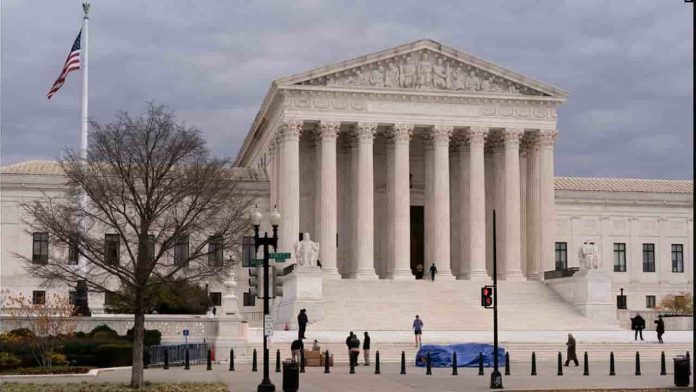By Kenneth Tiven
Given the resurgence in opposition to the US Supreme Court and unpopular opinions, some Court observers wonder if the justices are being less rigid in applying personal conservative thinking to matters of jurisprudence. The unexpected voting combinations with conservatives joining the more liberal three-person block suggests something, but what exactly is unclear. Some American states with Republican-controlled state legislatures want to cancel individual voters. This change would have upended American political life.
The US Supreme Court has ruled 6-3 to reject the so-called “independent state legislature doctrine” that would have let politically dominated state legislatures override any popular vote in national elections they did not like. The case of Moore vs Harper resulted from so much news about fake state electors’ behaviour in the 2020 presidential elections that it convinced Republicans that Donald Trump’s loss came from cheating. It did not. Additionally, two recent Supreme Court decisions have upheld the Voting Rights Act, which governs how state and federal elections are managed. Some states wanted to draw voting maps to pack minority group voters into a single Congressional district to reduce their influence below their proportion of the total voting population.
A year ago, the Court’s conservative majority ended a 50-year-old right to abortion for women in the USA. Medical consequences have been catastrophic for many families. This ruling in the Dobbs case has energized women and families in America into a potent force in the upcoming 2024 presidential election. The Court’s legitimacy as an impartial arbiter depends on judges not imposing their personal or religious beliefs on every possible case. The Court can’t stay out of the headlines as issues about its judgment swirl. Revelations that two of the most senior justices have played fast and loose with the Court’s largely unwritten rules on recusal in cases where someone appearing before the Court has provided an economic benefit to a Justice. The focus has been on Justices Samuel Alito and Clarence Thomas, the senior Republican appointees on the Court. Alito was so angry about a story about an expense-paid fishing trip to Alaska that he wrote a rebuttal for The Wall Street Journal before other media had even printed the story. Thomas remains adamant that his economic relationship with a Texas billionaire is not a problem.
The highly regarded federal judge J Michael Luttig was delighted, saying: “The Supreme Court’s long-awaited decision in Moore vs Harper is a resounding, reverberating victory for American Democracy.” Luttig, a Republican often previously considered for appointment to the Supreme Court, has publicly criticized lawyers and politicians backing this interpretation of the US Constitution. Luttig publicly contended the whole concept was to steal the 2024 election.
The argument was that the elections clause of the US Constitution intended to give state legislature supremacy over federal law in national elections. The clause reads: “The Times, Places and Manner of holding Elections for Senators and Representatives, shall be prescribed in each State by the Legislature thereof; but the Congress may at any time by Law make or alter such Regulations, except as to the Places of chusing (cq) Senators.”
Those embracing the independent state legislature doctrine tend to ignore other parts of the clause except the sentence reading, “Each State shall appoint, in such Manner as the Legislature thereof may direct, a Number of Electors.” Their idea that state legislatures can do as they wish to organize federal elections flies in the face of what we understand about the men who wrote the Constitution. Ignoring it 250 years later, this caught on in 2015. Republican election lawyers were intent on stopping an independent redistricting commission in Arizona. Then former President Trump and his allies picked it up to keep him in power after losing in 2020. They claimed that Republican state legislatures could swap electors for Trump rather than the Biden electors for whom the majority voted. It didn’t work then.
But, Moore vs Harper came from North Carolina, where the legislature drew a dramatic partisan gerrymander after the 2020 census. The North Carolina Supreme Court rejected the map, saying it violated the state constitution, and ordered it replaced.
Republicans in the state legislature petitioned the US Supreme Court, arguing that the state courts could not stop the legislature’s plan. The Court allowed the map to stand for the 2022 election. The state’s appeal failed. The Court affirmed that the legislature is not solely in control of elections, but must follow the rules of the states’ courts, which exist in the states.
—The writer has worked in senior positions at The Washington Post, NBC, ABC and CNN and also consults for several Indian channels


